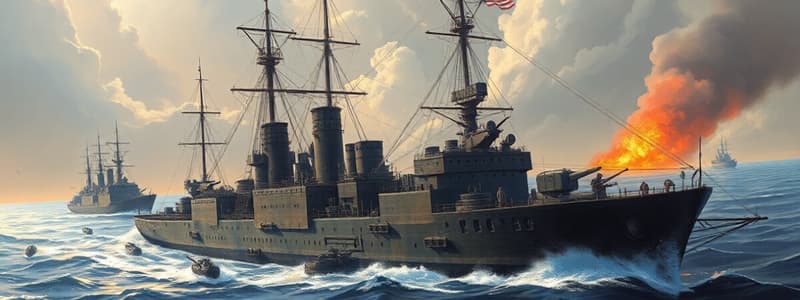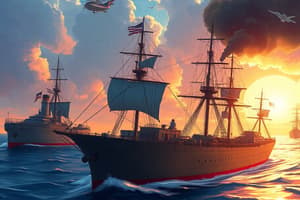Podcast
Questions and Answers
What is the primary focus of maritime strategy as defined in the text?
What is the primary focus of maritime strategy as defined in the text?
- The economic impact of naval trade routes.
- The design and construction of naval vessels.
- The tactical deployment of land forces in coastal regions.
- The principles governing warfare where the sea is a significant element. (correct)
What is naval strategy considered to be in relation to maritime strategy?
What is naval strategy considered to be in relation to maritime strategy?
- A component of maritime strategy focused on fleet movements. (correct)
- More important than maritime strategy in modern warfare.
- The overarching framework that dictates maritime strategy.
- A completely separate and unrelated field of study.
Why is it considered 'almost impossible' for naval action alone to decide a war, according to the text?
Why is it considered 'almost impossible' for naval action alone to decide a war, according to the text?
- Naval forces are inherently weaker than land forces.
- Modern technology has made naval power obsolete.
- Naval pressure is a slow process of exhaustion and requires land-based action for conclusive results. (correct)
- International laws prohibit decisive naval actions.
What is identified as a significant drawback of relying solely on naval pressure in warfare?
What is identified as a significant drawback of relying solely on naval pressure in warfare?
What does the text suggest is necessary for a 'firm decision' in warfare, contrasting with slow naval pressure?
What does the text suggest is necessary for a 'firm decision' in warfare, contrasting with slow naval pressure?
In most historical cases, great issues between warring nations have been decided by what means?
In most historical cases, great issues between warring nations have been decided by what means?
What is the 'paramount concern' of maritime strategy, as highlighted in the text?
What is the 'paramount concern' of maritime strategy, as highlighted in the text?
When can naval strategy effectively start to define how a fleet should operate?
When can naval strategy effectively start to define how a fleet should operate?
What kind of problem is 'co-ordination' between army and navy described as being?
What kind of problem is 'co-ordination' between army and navy described as being?
In situations where command of the sea is critically important, what might an army be required to do?
In situations where command of the sea is critically important, what might an army be required to do?
In contrast to assisting naval operations, what might be the 'immediate duty' of a fleet in relation to land actions?
In contrast to assisting naval operations, what might be the 'immediate duty' of a fleet in relation to land actions?
Why do 'crude maxims' that worked in continental warfare not apply as clearly when the sea becomes a significant factor in war?
Why do 'crude maxims' that worked in continental warfare not apply as clearly when the sea becomes a significant factor in war?
In maritime warfare, is it always sufficient to define the primary object as the destruction of the enemy's army or fleet?
In maritime warfare, is it always sufficient to define the primary object as the destruction of the enemy's army or fleet?
What makes the 'initial equations' of land and sea factors in warfare complex?
What makes the 'initial equations' of land and sea factors in warfare complex?
What does the text imply about 'rough-and-ready maxims' in the context of maritime strategy?
What does the text imply about 'rough-and-ready maxims' in the context of maritime strategy?
Upon what does the 'right handling' of the complex equations in maritime warfare depend?
Upon what does the 'right handling' of the complex equations in maritime warfare depend?
What is presented as the value of a theory of war in the context of maritime strategy?
What is presented as the value of a theory of war in the context of maritime strategy?
Which of the following best describes the relationship between maritime strategy and naval strategy according to the text?
Which of the following best describes the relationship between maritime strategy and naval strategy according to the text?
The text suggests that the value of a theory of war in maritime strategy is MOSTLY derived from its ability to:
The text suggests that the value of a theory of war in maritime strategy is MOSTLY derived from its ability to:
Considering the passage, which statement most accurately reflects the author's view on the application of simple rules in maritime strategy?
Considering the passage, which statement most accurately reflects the author's view on the application of simple rules in maritime strategy?
Flashcards
Maritime Strategy
Maritime Strategy
The principles governing war where the sea is a significant factor.
Naval Strategy
Naval Strategy
The part of maritime strategy focused on fleet movements.
Paramount concern of maritime strategy
Paramount concern of maritime strategy
Establishing the relationship between army and navy in war.
Limitations of naval action
Limitations of naval action
Signup and view all the flashcards
Strategy's Flexibility
Strategy's Flexibility
Signup and view all the flashcards
Study Notes
- Maritime strategy refers to the principles governing wars in which the sea plays a significant role.
- Naval strategy is a component of maritime strategy that dictates the movements of the fleet.
- Maritime strategy determines the fleet's role in relation to land forces.
- Naval action alone is almost never decisive in a war.
- Naval pressure works slowly through exhaustion, affecting commercial communities and neutrals.
- This slow pressure often leads to inconclusive peace terms.
- For a decisive outcome, a quicker and more impactful form of pressure is needed.
- Nations at war are typically decided by the army's actions against enemy territory or the fleet's influence on the army.
- A key aspect of maritime strategy is determining the relationship between the army and navy in war planning.
- Naval strategy can only be developed after the coordination between army and navy.
- Coordinating the army and navy can vary widely in its specific implementation.
- In some situations, securing command of the sea is critical, requiring the army to support the fleet.
- In other cases, the fleet's priority is to facilitate military action on land, before engaging the enemy fleet.
- Maxims successful in continental warfare are not directly applicable when the sea is largely involved.
- It is not enough to say the army's primary objective is to destroy the enemy's army, or the fleet's is to destroy the enemy's fleet.
- Land and sea factors interact intricately, making blunt solutions inappropriate.
- Successfully navigating these interactions requires a strong understanding of fundamental war principles.
- Such understanding allows for a clear, unobstructed view of the factors to consider.
- Theory in war achieves its highest value from this standpoint.
Studying That Suits You
Use AI to generate personalized quizzes and flashcards to suit your learning preferences.




